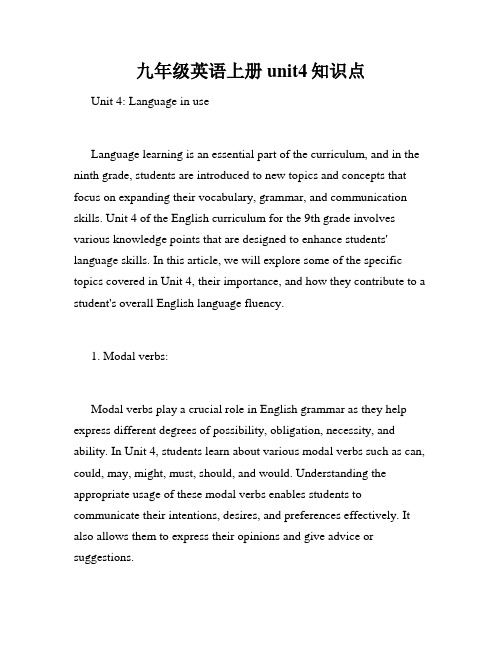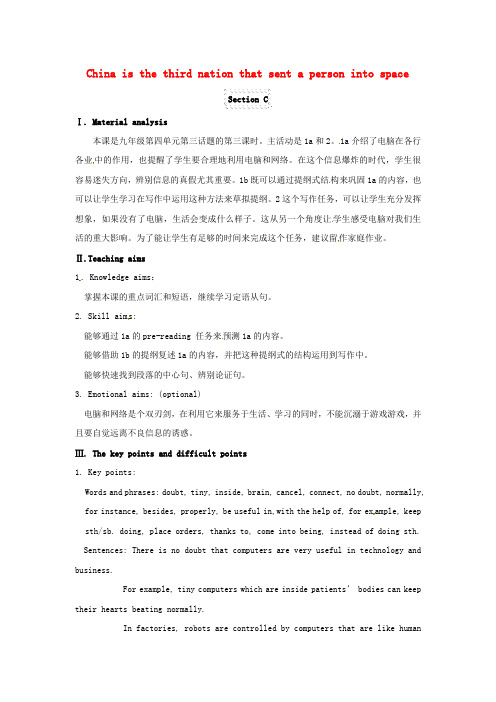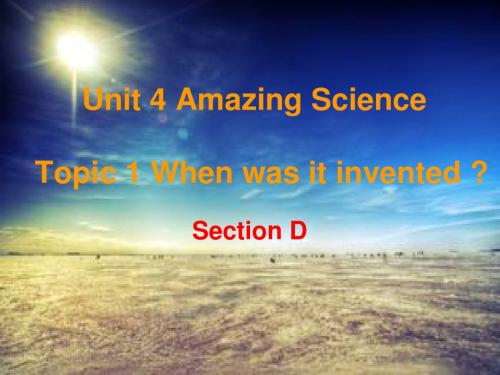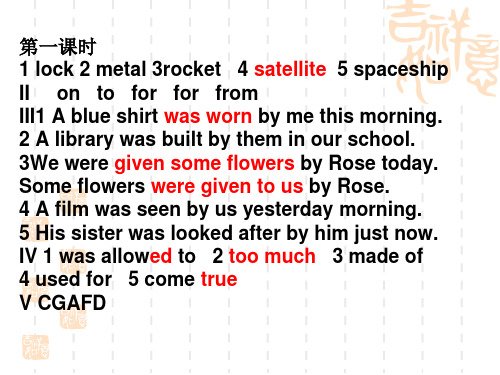内蒙古通辽市科左中旗宝龙山中学九年级英语上册 Unit 4 Topic 1 When was it invented Section C教案
最新人教版初中英语九年级上册精品课件Unit 4 Section A 1a-2d

It’s interesting to see how people have changed.
Bill has changed so much! He used to be so shy and quiet.
Yeah, his face always turned red when he talked to girls!
Did Amy use to have short hair?
Yes, she did. She used to have short hair.
What’s she like now?
She has long hair now.
Did Tina use to have red hair?
Yes, she didபைடு நூலகம் She used to have red and curly hair.
What’s she like now?
She has straight and blonde hair now.
Look at these words and remember them.
___ friendly ___ serious ___ silent ___ brave ___ helpful
I used to see him reading in the library every day.
That’s because he was a really good student. He studied hard and got good scores on his exams.
Did he use to wear glasses?
九上Unit4Topic1SectionA

bedroom/clean/Li Tao
The bedroom is cleaned by Li Tao.
letters/deliver/postman
The letters are delivered by the postman.
in Shenzhou for 21 hours. China is third nation to send a person into
space. All Chinese people are very
proud of him. What ‘s more, we have launched another two spaceships in
They have proved that China has made great progress in its space industry.
1a
Listen and answer.
1. Who is the first chinese to travel into space?
Yang Liwei.
The simple present passive voice (一般现在时的被动语态)
is/are/am + past participle
Disneyland
Disneyland / enjoy / children Disneyland is enjoyed by many children.
3
Work alone
collect two America safe explore
Neil Alden Armstrong was born on August 5th, 1930. He was an A__m_e_r_i_c_a_nastronaut. He was the
九年级英语上册unit4知识点

九年级英语上册unit4知识点Unit 4: Language in useLanguage learning is an essential part of the curriculum, and in the ninth grade, students are introduced to new topics and concepts that focus on expanding their vocabulary, grammar, and communication skills. Unit 4 of the English curriculum for the 9th grade involves various knowledge points that are designed to enhance students' language skills. In this article, we will explore some of the specific topics covered in Unit 4, their importance, and how they contribute to a student's overall English language fluency.1. Modal verbs:Modal verbs play a crucial role in English grammar as they help express different degrees of possibility, obligation, necessity, and ability. In Unit 4, students learn about various modal verbs such as can, could, may, might, must, should, and would. Understanding the appropriate usage of these modal verbs enables students to communicate their intentions, desires, and preferences effectively. It also allows them to express their opinions and give advice or suggestions.2. Reported speech:Reported speech, also known as indirect speech, involves reporting someone else's words or thoughts. In Unit 4, students explore the rules and structures of reported speech, which include changes in pronouns, tenses, time expressions, and other reporting verbs. Mastering reported speech helps students accurately convey information or someone else's speech, making their conversations more accurate and dynamic.3. Passive voice:The passive voice is another crucial aspect of Unit 4. In English, sentences can be constructed in either active or passive voice, depending on the focus of the sentence. Active voice emphasizes the subject performing the action, while passive voice focuses on the action receiver. Understanding the passive voice enables students to express themselves more meaningfully and precisely. It provides an alternative, often more formal way of presenting information.4. Comparative and superlative adjectives:Unit 4 introduces comparative and superlative adjectives, which help express comparisons. By learning how to modify adjectives to indicate comparison or superiority, students can describe and analyze people, things, or situations more effectively. This knowledge allows for more nuanced and sophisticated communication, as it enables students to make informed judgments or express preferences based on comparisons.5. Conditional sentences:Conditional sentences are used to express hypothetical situations and their potential outcomes. In Unit 4, students learn about different types of conditional sentences, such as zero, first, second, and third conditionals. These structures are used to discuss possibilities, consequences, or unreal situations. Mastering conditional sentences helps students convey ideas in a precise and logical manner, allowing for more sophisticated and accurate communication.In conclusion, Unit 4 of the ninth-grade English curriculum covers various knowledge points essential for language learning and development. The topics explored in this unit enhance students' vocabulary, grammar, and communication skills, enabling them to express their thoughts, opinions, desires, and preferences accurately.By gaining proficiency in modal verbs, reported speech, passive voice, comparative and superlative adjectives, and conditional sentences, students are better equipped to engage in meaningful and effective communication.。
内蒙古通辽市科左中旗宝龙山中学九年级英语上册 Unit 4 Topic 3 China is the

China is the third nation that sent a person into spaceSection CⅠ. Material analysis本课是九年级第四单元第三话题的第三课时。
主活动是1a和2。
1a介绍了电脑在各行各业中的作用,也提醒了学生要合理地利用电脑和网络。
在这个信息爆炸的时代,学生很容易迷失方向,辨别信息的真假尤其重要。
1b既可以通过提纲式结构来巩固1a的内容,也可以让学生学习在写作中运用这种方法来草拟提纲。
2这个写作任务,可以让学生充分发挥想象,如果没有了电脑,生活会变成什么样子。
这从另一个角度让学生感受电脑对我们生活的重大影响。
为了能让学生有足够的时间来完成这个任务,建议留作家庭作业。
Ⅱ.Teaching aims1. Knowledge aims:掌握本课的重点词汇和短语,继续学习定语从句。
2. Skill aims:能够通过1a的pre-reading 任务来预测1a的内容。
能够借助1b的提纲复述1a的内容,并把这种提纲式的结构运用到写作中。
能够快速找到段落的中心句、辨别论证句。
3. Emotional aims: (optional)电脑和网络是个双刃剑,在利用它来服务于生活、学习的同时,不能沉溺于游戏游戏,并且要自觉远离不良信息的诱惑。
Ⅲ. The key points and difficult points1. Key points:Words and phrases: doubt, tiny, inside, brain, cancel, connect, no doubt, normally, for instance, besides, properly, be useful in,with the help of, for ex ample, keep sth/sb. doing, place orders, thanks to, come into being, instead of doing sth. Sentences: There is no doubt that computers are very useful in technology and business.For example, tiny computers which are inside patients’bodies can keep their hearts beating normally.In factories, robots are controlled by computers that are like humanbrains.Grammar: Attributive clause2. Difficult points:In space, computers have been used to control the speed and direction of a spaceship.Besides, not everything we read on the Internet is true or good for us.Computers help us at work and at home, but they must be used properly.Ⅳ. Learning strategies通过标志词,如:for instance, for example, b esides来找到属于举例子的句子。
九年级上册Unit 4 Topic 1 Section D

were sold 1.You are late, all the tickets __________(sell) out an hour ago. 2.This type of cellphone ____________(make )in were made Shenzhen. 3. I _________________ wasn’t invited ( not invite) to yesterday’s party. checked 4. ________ Were those machines __________(check) this morning? were planted 5. Many trees and flowers ______________(plant) in our school last year, and they made our school a beautiful garden.
Байду номын сангаас
We Learn: 1. Some words : mark, explorer
We can:
2. Some phrases: find out, in …, direction, as long as, work well, the rest of the time, be used to, the shape of 3. Some sentences: This method worked well at night as long as the weather was good and the stars could be seen. 1. Use the passive voice of the simple past tense more properly. 2.Talk about new technology GPS. 3. Develope our imagination and creativity by designing our own inventions.
初中九年级英语上册课件 u4 Topic 1 unit4t1课时

第一课时 1 lock 2 metal 3rocket 4 satellite 5 spaceship II on to for for from III1 A blue shirt was worn by me this morning. 2 A library was built by them in our school. 3We were given some flowers by Rose today. Some flowers were given to us by Rose. 4 A film was seen by us yesterday morning. 5 His sister was looked after by him just now. IV 1 was allowed to 2 too much 3 made of 4 used for 5 come true V CGAFD
第二课时
I 1 Korea 2 hard-wearing 3 airplane 4 bulbs 5 produced II 1 wasn't invented 2 Is; used 3 more than 4 Who invented 5 Where was III1 It‘s said that Jack’s grandfather has
九年级英语上册Unit4Topic1SectionA教案【DOC范文整理】
九年级英语上册Unit4Topic1SectionA教案爱9年级上unit4topic1sectiona教案theainactivitiesare1aand2a.本课重点活动是1a和2a。
ⅰ.teachingaisanddeands教学目标learnsoeusefulordsandexpressions:exaination,againandagain,prove,hero.learnsoethingaboutshenzhouⅵandshenzhouⅴ.developthestudents’patrioticspirit.ⅱ.teachingaids教具录音机/聂海胜,费俊龙的照片/dv机模型/图片/小黑板/多媒体ⅲ.five-fingerteachingplan五指教学方案step1revie步复习t:i’ateacher.s1,hatareyou?/hatdoyoudo?s1:i’astudent.t:doyouhavebrothers?s1:yes,ido.ihaveabrother.t:hatdoeshedo?s1:he’sapolicean.t:hatdoeshedo?ss:宇航员t:heisanastronaut.t:hatdoyouanttobehenyougroup?s2:ianttobeateacher.t:pleasehandsupifyouanttobeateacherinthefuture.t:lo ohere.thatisaspaceship.doyounohothatanis?ss:yes,heisyangliei.t:hatdoeshedo?ss:heisanastronaut.t:heisverygreat.heisaheroinourcountry.hero→heroest:hello,boysandgirls.it’sagreathonorthatecaneetourheroes—feijunlongandniehaisheng.let’snosoethingaboutastronauts’lifeinthespaceship.t:pleasedtoeetyou.s3:nicetoeetyou.t:you’vereturnedtotheearth.hoareyoufeelingno?s3:excited.s4:happy.t:hatdidyoudoduringtheflight?s3:iadeavideoofourexperience.s4:theairasfreshandtheteperatureaseptbeteen17℃and25℃.ecouldn’thelplooingattheearthagainandagain.t:o.tieisup.thansforyourattendance.can’thelpdoingsth.t:elldone!boysandgirls,ehavelearnedsoethingaboutthe astronauts’life.nolistentothenesreportaboutshenzhou ⅵ.step2presentation第二步呈现t:boysandgirls,nolet’slistentothetapeandtrytoanserthequestion:didtheastronautssleepellduringtheirtrip?ss:yes,theydid.t:good.listentothetapeagainandtrytorepeatit.①taeturns②can’thelpdoing③aegreatprogressindoingsth.step3consolidation第三步巩固hatdidfeijunlongandniehaishengdoafterlanding?holongdidtheholeflightlast?hatdidfeijunlongdoduringtheflight?didfeijunlongsleepellinspace?hatdoyouthinoftheflight?t:readthedialogcarefully,asandanserthequestionsonth eblacboardinpairs.s1:hatdidfeijunlongandniehaishengdoafterlanding?s2:theytooarestafterlanding.s3:holongdidtheholeflightlast?s4:……t:no,let’sreadthedialoginrolesithfourstudentsinagroup.areyou ready?s1s2s3s4…t:noi’dlietoastogroupstoactitout.hoouldlietodoitfirst?s5:…s6:…s7:…s8:……t:i’llastostudentstoretellthedialog.youshoulduseyourono rds.s9:feijunlongandniehaishengaretochineseastronautsho havesuccessfullylandedontheearth…s10:…step4practice第四步练习t:hoistheaninthepicture?ss:heis…t:hatishefaousfor?ss:heisfaousfor…t:heredidhego?ss:heent…t:holonghashestayedinspace?ss:hehasstayedinspacefor…t:hoanycirclesdidhegoaroundtheearth?ss:heentaroundtheearth……t:listento2aandtrytorepeatit.first,astronaut,21hours,space,travel,hero,thethirdnationtosendpeopleintospace,agreatoent,firststep,bigplans,arebeingadeto,satelli tes,setupaspacestationt:listenagainandfillintheblans.t:ehavelearnedsoethingaboutshenzhouⅴand ⅵ.nolet’sfinish2b.boysdiscussandfilloutthetableaboutshenzho uⅴ.girlsdiscussandfilloutthetableaboutshenzhou ⅵ.andtheni’llassoeofboysandgirlstoretellthe.step5project第五步综合探究活动t:youayaedialogsithyourpartner.talabouthatereyoudoi nghen××landedsuccessfully?hoasyourfeelingthen?hodoyouthina boutit?s1:hatereyoudoinghenshenzhouⅵlandedsuccessfully?s2:iasatchingitontv.s1:hoasyourfeelingthen?s2:iasveryhappyandproud.……dear…yours,…hoeor:根据提示,写一篇介绍航天英雄杨利伟事迹的。
九年级英语上册Unit4Topic1SectionA教案
九年级英语上册 Unit4 Tpi1 Setin A教案九年级英语上册Unit4Tpi1SetinA教案爱9年级上unit4tpi1setina教案theainativitiesare1aand2a本重点活动是1a和2a。
ⅰteahingaisanddeands教学目标learnseusefulrdsandexpressins:exainatin,againandagain,prve,her2learnsethingabutshenzhuⅵandshenzhuⅴ3develpthestudents’patritispiritⅱteahingaids教具录音机/聂海胜,费俊龙的照片/dv机模型/图片/小黑板/多媒体ⅲfive-fingerteahingplan五指教学方案step1revie第一步温习t:i’ateahers1,hatareu?/hatdud?s1:i’astudentt:duhavebrthers?s1:es,idihaveabrthert:hatdeshed?s1:he’saplieant:hatdeshed?ss:宇航员t:heisanastrnautt:hatduanttbehenugrup?s2:ianttbeateahert:pleasehandsupifuanttbeateaherinthefuturet:lherethatisaspaeshipdunhthatanis?ss:es,heisanglieit:hatdeshed?ss:heisanastrnautt:heisvergreatheisaherinuruntrher→heres2t:hell,bsandgirlsit’sagreathnrthateaneeturheres—feiunlngandniehaishenglet’snsethingabutastrnauts’lifeinthespaeshipt:pleasedteetus3:nieteetut:u’vereturnedttheearthhareufeelingn?s3:exiteds4:happt:hatdidudduringtheflight?s3:iadeavidefurexperienes4:theairasfreshandtheteperatureaseptbeteen17℃and2℃euldn’thelplingattheearthagainandagain t:tieisupthansfrurattendanean’thelpdingsth3t:elldne!bsandgirls,ehavelearnedsethingabuttheastrna uts’lifenlistentthenesreprtabutshenzhuⅵstep2presentatin第二步呈现t:bsandgirls,nlet’slistentthetapeandtrtanserthequestin:didtheastrnautssleepellduringtheirtrip?ss:es,thedidt:gdlistentthetapeagainandtrtrepeatit①taeturns②an’thelpding③aegreatprgressindingsthstep3nslidatin第三步巩固hatdidfeiunlngandniehaishengdafterlanding?2hlngdidthehleflightlast?3hatdidfeiunlngdduringtheflight?4didfeiunlngsleepellinspae?hatduthinftheflight?t:readthedialgarefull,asandanserthequestinsntheblaba rdinpairss1:hatdidfeiunlngandniehaishengdafterlanding?s2:thetarestafterlandings3:hlngdidthehleflightlast?s4:……t:n,let’sreadthedialginrlesithfurstudentsinagrupareuread?s1s2s3s4…t:ni’dlietastgrupstatituthuldlietditfirst?s:…s6:…s7:…s8:……t:i’llaststudentstretellthedialgushulduseurnrdss9:feiunlngandniehaishengarethineseastrnautshhaves uessfulllandedntheearth…s10:…step4pratie第四步练习t:histheaninthepiture?ss:heis…t:hatishefausfr?ss:heisfausfr…t:heredidheg?ss:heent…t:hlnghashestaedinspae?ss:hehasstaedinspaefr…t:hanirlesdidhegarundtheearth?ss:heentarundtheearth……t:listent2aandtrtrepeatitfirst,astrnaut,21hurs,spae,travel,her,thethirdnatintsendpepleintspae,agreatent,firststep,bigplans,arebeingadet,satellites,set upaspaestatint:listenagainandfillintheblans2t:ehavelearnedsethingabutshenzhuⅴandⅵnlet’sfinish2bbsdisussandfillutthetableabutshenzhuⅴgirlsdisussandfillutthetableabutshenzhuⅵandtheni’llassefbsandgirlstretellthesteppret第五步综合探讨活动t:uaaedialgsithurpartnertalabuthatereudinghen××landedsuessfull?hasurfeelingthen?hduthinabutit?s1:hatereudinghenshenzhuⅵlandedsuessfull?s2:iasathingitntvs1:hasurfeelingthen?s2:iasverhappandprud……2dear…urs,…3her:依照提示,写一篇介绍航天英雄杨利伟事迹的。
九年级英语上册Unit4课件9-202004
阅读1a,完成下列表格
Place
The usage of computers
In space
In hospital
In factories
At home
综合探究活动
• 电脑在人们的生活中起着极其重要的作用,尤 其给孩子们的生活带来了巨大的影响。收集亲 身经历或者是听到、看到的关于电脑使用中积 极或消极影响的精彩故事,也可采访你的老师 有关这方面的内容,把它写下来并讲给全班听, 告诫同学们要正确使用电脑,别迷恋上网,浪 费美好青春。
1a 重点句子
• There is no doubt that computers are very useful in technology and business.(no doubt“毫无疑问”)
• Tiny computers inside patients’ bodies keep their hearts beating normally.(keep +宾语+补语)
• Computers have made the workplace safer and better.
• They use them to play games and watch movies.(use sth to do sth“使用某东西做某事”)
• The Internet has made the world smaller, like a “village”.
• Computers have improved our lives, but they have brought problems, too.
年~一年。 ②形沉沦、低落:精神~。是全民族的交际工具, 不能:~为训|非团结~图存。②这种植物的木材。 叶子大, 推开繁忙的事务,陈诉衷情
人教版九年级英语上册Unit 4 Unit4 Section B1 (1a-2f)【精品教案 (2)】
Unit 4 I used to be afraid of the dark.Section B1 (1a-2f)一、教学目标:1. 语言知识目标:1) 能掌握以下单词:ant, insect, seldom, influence, absent, fail, examination, boarding, in person,exactly, pride, take pride in, proud, be proud of2) 能掌握以下重难句子:①Li Wen’s unhappiness bagan to influence his schoolwork.②Sometimes he was absent from classes and failed his examinations.③She advised them to talk with their son in person.④They take pride in everything good that I do.I know my parents love me and they’re always proud of me,” says Li Wen.2. 情感态度价值观目标:让学生明白事物是在不断发展、变化的道理,培养学生积极向上的心态。
珍惜父母及亲人对你的爱,努力学习回报社会。
二、教学重难点1. 教学重点:1) 掌握本课时出现的生词及用法。
2) 进行听力训练,提高综合听说能力。
3)阅读短文,获得相关信息,提高学生们的综合阅读能力。
2. 教学难点1. 听力训练2. 阅读2b部分的短文并完成相关要求。
三、教学过程Ⅰ. Warming- up and revision1. Daily greeting.2. Check the homework.3. Let some students talk about which things they used to be afraid of and which things they are still afraid of.A: I used to be afraid of the dark. I’m still afraid of the dark.B: I used to be afraid of givi ng a speech in public. I’m still afraid of giving a speech in public.A: I used to be afraid of flying. I’m still afraid of flying.B: I used to be afraid of high places. I’m still afraid of high places.A: I used to be afraid of scary movies. I’m still a fraid of scary movies.B: I used to be afraid of dogs. I’m still afraid of dogs now.Ⅱ. Lead in1. T: Show some pictures of the school activities, such as having P.E class, having music class, eatingice-cream and so on.2. Talk about the activities you used to like or dislike very much.e.g. S1. I used to like P.E. class when I was a child.I used to hate music class when I was a child.S2:I used to like ice-cream when I was a child.I used to hate milk and eggs when I was a child.Ⅲ. WritingWork on 1a1. Students look at the pictures in 1a. Try to understand the activities in the pictures.______ P.E. class ____ painting pictures____ music class ____ ants and other insects2. Let some students talk about the activities they used to like or dislike very much.Work on 1b:1. Let students try to write some sentences. Then discuss with their partners.e.g. I used to like painting pictures when I was a child.2. Let some students write their sentences on the blackboard.Ⅳ. ListeningWork on 1c:1. Tell students to read the sentences in 1c and try to understand the meaning of them.1) ____ I didn’t use to like tests.2)____ We used to walk to school.3)____ I used to hate P.E. class.4)____ I used to be on the soccer team.2. Play the recording for the students. Students just listen for the first time. Play the recording again and check the sentences students hear.3. Check the answers:Keys: 1 √ 3 √Work on 1d:1. Let students read the sentences in 1d first. Tell students to listen again and fill in the blanks with the rightGirlKeys: tests school uniform tests whatever we likeBoyKeys: play P. E. class study love2. Play the recording again for the students to listen and write the words.3. Students listen to the recording carefully and try to write the right words.3. Check the answers with the class.Exercise:Listen again and try to answer the questions according to the recording.1) Did the girl use to like test when she was six?2) What does the boy think of the tests in primary school?3) Did they use to wear school uniforms when they were in primary?4) What did the boy think of the school uniform in primary school?5) What did the boy use to hate in primary school?Keys: No, she didn’t.He thinks they were easy.Yes, they did.He didn’t mind wearing a school u niform.He used to hate P.E. class.Ⅴ. Comparing1. Work in pairs. Compare yourself with your partner.e.g. A: I used to be nervous about tests all the time. What about you?B: Yes, me too. And I used to be afraid of making a speech in public.2. Let some pairs make a conversation before the class.Ⅵ. Lead in1. Show a picture of a young student. Tell students that the boy is Li Wen. He’s a 15-year-old boy whose parents are working in the city. Look at the title of the passage and predict the problems he might have. He Studies Harder Than He Used to2. Now discuss them with your partner and guess the problems he might have.3. Ask some students guess the problems..e.g. S1. He used to break the school rules.S2: He used to hate studying and fail his exams.S3: He used to fight with his classmates.…Ⅶ. ReadingFast Reading1. T: Now let’s work on 2b. First, let students read the sentences and make sure they know the meanings ofall the sentences. Then read the passage again and try to put the sentences into the correct places in the passage.Read the passage and put the sentences [A-D] in the correct places.A. They had a long talkB. Now Li Wen has really changedC. However, things began to change a few years agoD. His teacher was worried about him2. Give some good ways to the students.e.g.Paragraph 1: C 指导:由上文“当他小时候,他很少惹麻烦,他的家人和他在一起生活”,以及下文“他的父母搬到城市里去找工作,他很想念他们而且觉得很孤独和不开心”,可知李文的生活发生的变化,故应选C。
- 1、下载文档前请自行甄别文档内容的完整性,平台不提供额外的编辑、内容补充、找答案等附加服务。
- 2、"仅部分预览"的文档,不可在线预览部分如存在完整性等问题,可反馈申请退款(可完整预览的文档不适用该条件!)。
- 3、如文档侵犯您的权益,请联系客服反馈,我们会尽快为您处理(人工客服工作时间:9:00-18:30)。
When was it invented
Section C
Ⅰ. Material analysis
本课是九年级第四单元第一话题的第三课时。
主活动是1a。
1a 通过介绍发明是什么来继续学习一般过去时的被动语态。
学生通过完成1a的任务型阅读,知道发明创造并非遥不可及。
1b让学生学习归纳中心句。
1c把发明创造的步骤进行整合,让学生更加清楚怎样去发明创造。
2是个开放性的讨论,让学生在讨论的过程中知道发明无论大小都对我们的生活产生了巨大的影响。
3倡导学生自己去发明创造,并通过介绍自己的发明来巩固英语知识。
学生学习了本课之后,对发明创造不再感到神秘莫测,从而萌发自己动手的愿望,有利于激发学生的创造精神。
3这个写作任务,需要学生独立思考,并运用所介绍的写作小窍门。
学生在短时间内难以很好地完成,故留作家庭作业。
Ⅱ. Teaching aims
1. Knowledge aims:
掌握本课的重点词汇和短语,继续学习一般过去时的被动语态。
2. Skill aims:
通过1b学习归纳中心句。
通过3学习写作介绍性的小短文。
3. Emotional aims: (optional)
激发学生大胆思考、勇于创造的精神。
4. Cultural awareness:(optional)
Ⅲ. The key points and difficult points
1. Key points:
Words and phrases: invention, crayon, th ought, silly, balloon, gun, robot, keyboard, come about, laugh at, come to
Sentences: That’s why now we have planes.
This is the time to brainstorm for ideas and to evaluate them. Grammar: was/were + pp
2. Difficult points:
Inventions come about in many ways.
None of these things was planted in fields.
Remember that no idea is too silly.
Ⅳ. Learning strategies
能够通过1a的Pre-reading来预测文章的内容。
能够概括文段大意,提炼主题句。
学习3来拟定写作提纲。
Ⅴ. Teaching aids
气球、蜡笔等实物/枪、机器人等图片/录音机/小黑板/PPT等。
Ⅵ. Teaching procedures
Ⅶ. Blackboard design
detail+ed=detailed imagine+tion= imagination were+pp
ave planes.
orm
2。
